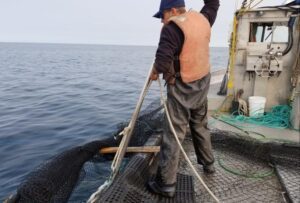
(The Center Square) — U.S. House Speaker Kevin McCarthy is throwing his weight behind a push to scrap a decades-old legal doctrine giving federal regulators wide-ranging powers.
The Republican-controlled House of Representatives has filed an amicus brief in support of a lawsuit filed in 2020 by New Jersey commercial fisherman, challenging a federal rule requiring them to pay for monitors to go out on fishing vessels to collect data to craft new regulations.
The lawsuit, pending before the U.S. Supreme Court, calls for scrapping the fish monitoring rules but also seeks to blunt the powers of federal agencies by overturning the so-called Chevron deference. Critics say the legal principle violates the separation of powers doctrine by giving the federal government authority over congressional spending.
House lawyers argue that a ruling against the fisherman that preserves the Chevron deference “will affect Congress’s ability to safeguard its constitutional authorities and the separation of powers that helps ensure the liberties of the American people.”
“This case is a textbook example of that phenomenon because it involves an agency attempting to evade Congress’s power of the purse,” they wrote in the 29-page brief. “Congress controls how much an agency may spend and dictates how an agency may spend that money.”
In a statement, McCarthy said the House’s involvement in the legal challenge is part of a broader agenda by Republicans “to hold Washington accountable” by blunting the federal government’s powers.
“As part of our Commitment to America, House Republicans pledged to hold Washington accountable,” he said. “The Chevron framework makes it easier for unelected bureaucrats to weaponize federal regulations against the American people. The Court should rein in the power of unelected bureaucrats and restore the separation of powers.”
The legal doctrine, which has survived previous challenges, stems from the Supreme Court’s 1984 ruling in Chevron v. National Resources Defense Council, in which the Supreme Court said judges should defer to federal agencies in “ambiguous situations” as long as its interpretation of a law is “reasonable.”
Observers say if the court overturns the Chevron doctrine, it could have wide-ranging implications for the Biden administration’s policies, particularly regarding climate change.
The National Marine Fisheries Service argues in court filings that the Magnuson-Stevens Fishery Conservation and Management Act and regional fisheries management programs require vessels to “carry” observers to collect data on fish stocks. Lawyers for the federal agency have urged justices not to overturn the Chevron doctrine.
Commercial fishing groups from several states, including Rhode Island and West Virginia, have filed legal briefs supporting the lawsuit. The legal fight has also drawn interest from watchdog groups like the Cato Institute, New England Legal Foundation and Pacific Legal Foundation, which have also filed briefs supporting the plaintiffs.
A U.S. District Court judge previously rejected the lawsuit, which a divided federal Appeals Court later upheld. But the commercial fishing groups filed a petition to the Supreme Court, which agreed to take up the case in May.

